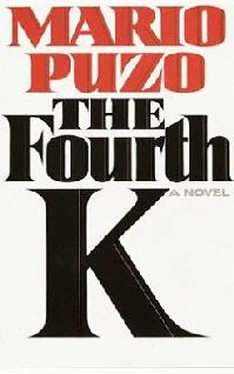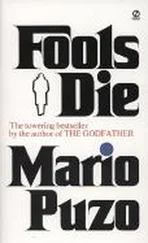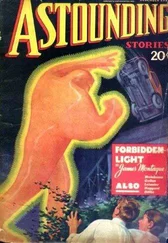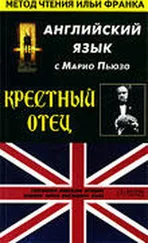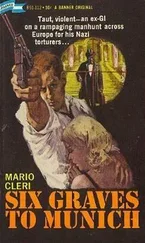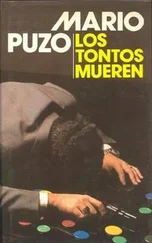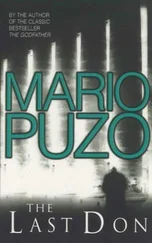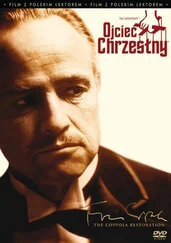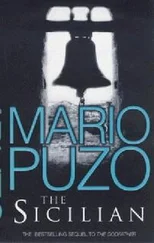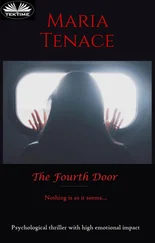Now Eugene Dazzy appeared and told him it was time. They were waiting for him in the Cabinet Room.
When Kennedy entered, everyone stood up. He quickly motioned for them to be seated, but they surged around him to offer their sympathy. Kennedy made his way to the head of the long oval table and sat in the chair near the fireplace.
Two pure– white-light chandeliers bleached the rich brown of the table, glistened the black of the leather chairs, six to each side of the table, and more chairs along the back of the far wall. And there were other sconces of white light that shone from the walls. Next to the two windows that opened to the Rose Garden were two flags, the striped flag of the United States and the flag of the President, a field of deep blue filled with pale stars.
Kennedy's staff took the seats nearest him, resting their information logs and memorandum sheets on the oval table. Farther down were the Cabinet members and the head of the CIA, and at the other end of the table, the chairman of the Joint Chiefs of Staff, an Army general in full uniform, a gaudy color cutout in the somberly dressed group. Vice President Du Pray sat at the far side of the table, away from Kennedy, the only woman in the room. She wore a fashionable dark blue suit with a white silk blouse. Her handsome face was stem. The fragrance of the Rose Garden filled the room, seeping through the heavy curtains and drapes that covered glass-paneled doors. Below the drapes the aquamarine rug reflected green light into the room.
It was the CIA chief, Theodore Tappey, who gave the briefing. Tappey, who had once been head of the FBI, was not flamboyant or politically ambitious.
And had never exceeded the CIA charter with risky, illegal or empire-building schemes. He had a great deal of credit with Kennedy's personal staff, especially Christian Klee.
"In the few hours we had, we've come up with some hard information," Tappey said. "The killing of the Pope was carried out by an all-Italian cadre. The hijacking of Theresa's plane was done by a mixed team led by an Arab who goes by the name Yabril. The fact that both incidents happened on the same day and originated in the same city seems to be coincidence. Which, of course, we must always mistrust."
Kennedy said softly, "At this moment the killing of the Pope is not primary. Our main concern is the hijacking. Have they made any demands yet?"
Tappey said quickly and firmly, "No. That's an odd circumstance in itself."
Kennedy said, "Get your contacts on negotiation and report to me personally at every step." He turned to the Secretary of State and asked,
"What countries will help us?"
The Secretary said, "Everyone-the other Arab states are horrified, they despise the idea of your daughter being held hostage. It offends their sense of honor and also they think of their own custom of the blood feud.
They believe they cannot derive any good from this. France has a good relationship with the Sultan, They offered to send in observers for us.
Britain and Israel can't help-they are not trusted. But until the hijackers make their demands we're sort of in limbo."
Kennedy turned to Christian. "Chris, how do you figure it, they're not making demands?"
Christian said, "It may be too early. Or they have another card to play."
The Cabinet Room was eerie in silence; in the blackness of the many high heavy chairs the white sconces of light on the walls turned the skin of the people in the room into a very light gray. Kennedy waited for them to speak, all of them, and he closed down his mind when they spoke of options, the threat of sanctions, the threat of a naval blockade, the freezing of Sherhaben assets in the United States-the expectation that the hijackers would extend the negotiation interminably to milk the TV time and news reports all over the world.
After a time Kennedy turned to Oddblood Gray and said abruptly, "Schedule a meeting with the congressional leaders, the relevant committee chairmen, for me and my staff." Then he turned to Arthur Wix. "Get your national security staff working on plans if this thing turns into something wider." Then Kennedy stood up to leave. He addressed them all.
"Gentlemen," he said, "I must tell you I don't believe in coincidence. I don't believe the Pope of the Roman Catholic Church can be murdered on the same day in the same city that the daughter of the President of the United States is kidnapped."
Adam Gresse and Henry Tibbot had put aside Easter Sunday as a day of work.
Not on their scientific projects but on cleaning up all traces of their crime. In their apartment, they bundled up all their old newspapers from which they had cut letters to compose their message. They vacuumed to remove the tiny fragments of scissored papers. They even got rid of the scissors and glue. They washed down the walls. Then they went to their university workshop to get rid of all the tools and equipment they had used to construct their bomb. It did not occur to them to turn on the television until their task was completed. When they heard the news of the killing of the Pope and the kidnapping of the President's daughter, they looked at each other and smiled. Adam Gresse said, "Henry, I think our time has come."
It was a long Easter Sunday. The White House was filling up with staff personnel of the different action committees set up by the CIA, the Army and the Navy, and the State Department. They all agreed that the most baffling fact was that the terrorists had not yet made their demands for the release of the hostages.
Outside, the streets were congested with traffic. Newspaper and TV reporters were flocking into Washington. Government staff workers had been called to their desks despite its being Easter. And Christian Klee had ordered a thousand extra men from the Secret Service and the FBI to provide additional protection for the White House.
The telephone traffic in the White House increased in volume. There was bedlam, people rushing to and fro from the White House to the Executive Office Building. Eugene Dazzy tried to bring everything under control.
The rest of that Sunday in the White House consisted of Kennedy's receiving reports from the Situation Room, long solemn conferences on what options were open, telephone conversations between heads of foreign countries and the Cabinet members of the United States.
Late Sunday night the President's staff had dinner with him and prepared for the next day. They monitored the TV news reports, which were continuous.
Finally, Kennedy decided to go to bed. He was confident that his staff would keep vigil throughout the night and wake him when necessary. A Secret Service man led the way as Kennedy went up the small stairway that led to the living quarters on the fourth floor of the White House.
Another Secret Service man trailed behind. They both knew that the
President hated to take the elevators in the White House.
The top of the stairs opened into a lounge, which held a communications desk and two more Secret Service men. When he passed through that lounge,
Kennedy was in his own living quarters, with only his personal servants: a maid, a butler and a valet, whose duty it was to keep track of the extensive presidential wardrobe.
What Kennedy did not know was that even these personal servants were members of the Secret Service. Christian Klee had invented this setup.
It was part of his overall plan to keep the President free from all harm, part of the intricate shield Christian had woven around Francis Kennedy.
When Christian had put this wrinkle into the security system he had briefed the special platoon of Secret Service men and women. "You're going to be the best goddamn personal servants in the world, and you can go straight from here and get a job in Buckingham Palace. You already know your first duty is to take any bullets thrown at the President. But it will be as much your duty to make the private life of the President comfortable."
Читать дальше
